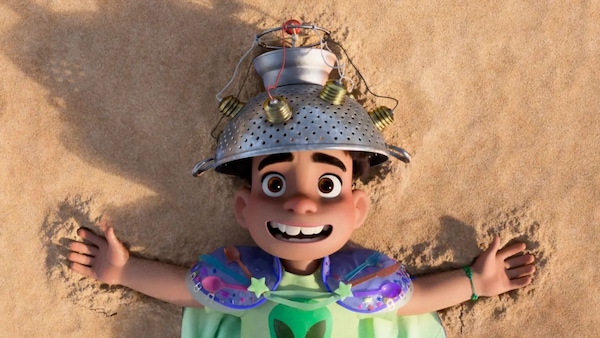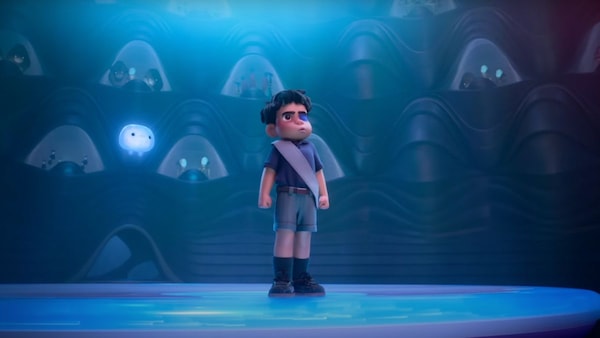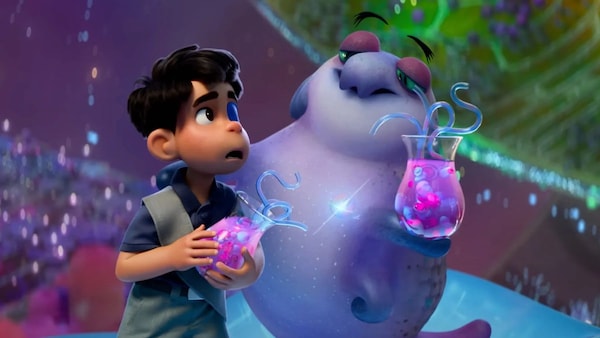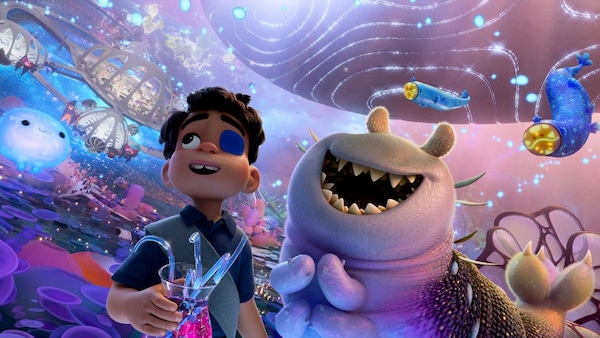Elio Is A Savoury Pixar-Flavoured Snack For Thought
Elio underlines a rather sweet and disarming notion: that space travel is a collective reaction to loneliness just as much as a burning interest in the unknown.

Still from Elio.
Last Updated: 08.08 PM, Jun 18, 2025
PIXAR'S children’s-films-for-adults slate has been running on fumes for a while. The inventive settings and cultural oddities aside, all the stories and themes have begun to coalesce into a blob of curated wonder. Running out of ideas is normal, but running out of ways to explore them is a bit alarming. Sometimes, the “back to the drawing board” mood shows. After the disappointing Elemental, the Lilo-and-Stitch-coded Elio further gentrifies the misfit-orphan-meeting-alien and reaching-for-the-stars template. There’s a design about the dreaminess that’s no longer...new. It revolves around an 11-year-old space fanatic, Elio, who lives with his young aunt, Major Olga Solis, on an American Air Force Base. The lonely kid’s only goal is to be abducted by aliens. He spends his days in the middle of self-created crop circles on the beach that screams “abduct me!”.
When he’s finally beamed up to an interplanetary organisation composed of ‘ambassadors’ from several galaxies, his cosmic misadventure — being mistaken as Earth’s leader (and an adult); being a negotiator; bonding with a cute worm-like son Glordon of the warlord villain; sending his clone back to cover up for him on Earth — begins. You know how it goes. Elio finds a sense of belonging up there. Olga’s career is compromised by her sudden guardian status. Glordon becomes the eccentric Dory-in-Finding-Nemo crowd puller. Warlord dad softens. The plot itself goes by the book. You can tell that almost too many cooks — writers, directors, animators, executives — are involved.

But despite all these little contrivances and derivations, there’s something original and hopeful about the way Elio expresses itself. In an age of live-action remakes and cash-grabbing franchises and superhero overkill, it’s easy to take Pixar’s commitment to the founding stones of storytelling for granted. The thing about Elio is that it unfolds like a child has conceived it and adults have executed it — in the best possible manner. It has a wildness and shapelessness that stems from young minds yet to be diluted by the inbred commercialism of growing up. The Communiverse that Elio is ‘abducted’ into is a very Calvin-and-Hobbes-like slice of mad-scientist fantasy: liquid supercomputers, insect-like and soft-spoken leaders, a carnival-styled atmosphere, limitless powers, an intergalactic vibe of inclusivity, endless identities.

Aliens are not scary and ghastly creatures here (well, physically they still are — but don’t judge a book by their cover), they’re figments of the very imagination that helps kids cope with isolation, social anxiety, queerness and most of all, unresolved grief. It’s how a child thinks, undoing the unfair reputation of aliens and space exploration in Hollywood science-fiction over the years. One embraces the great unknown rather than fearing it. Even the war-loving bad guy is good because he’s a parent at odds with his war-hating kid’s struggle for acceptance. Every horror trope — like the chilling intro-shot of a predatory-looking monster — is diffused; nobody is evil here, regardless of the stories that governments and history tell us about those that don’t look or sound like us. The metaphors write themselves.

The no-rules and fluid adventure is a manifestation of Elio’s space-crazy obsessions: the psychological escape he often resorts to when he feels misunderstood and rejected by the world. At the back of the viewer’s mind, there’s the lingering sense that none of it is real, he’s imagining the whole thing, and that makes it even more bittersweet. His space is a visual subset of his mindspace — a kind of Inside Out and Where The Wild Things Are sort of environment where Elio is actually processing the loss of his parents, the ‘alienation’ he feels and the steep arc he takes to come out the other side with his aunt. He’s probably all spaced out and wreaking havoc on the Air Force Base, sleeping late and having vivid dreams, but the film we see is just a colourful projection of the same. Everyday life and coping mechanisms aren’t the most interesting to watch, especially in a medium like animation, so the fantastical journey — where there are enough clues of Elio’s real-world existence — is the result.

Another thing that humanises Elio is its conflation of the big and the small; the celestial and personal. The planet’s extraterrestrial curiosity about “Are we alone?” in this galaxy ties into the core of Elio’s grief-fuelled “am I alone?”. He looks at — and within — the stars for answers that science has always been seeking. His grief makes him unique, and being unique makes him feel alone, a trait that speaks to a wider question about human life and the fear of meaning nothing. The eeriness of the question, though, morphs into a kinder and playful one: No, Earth is not alone, and they are more than welcome to join a wider network of cosmic peacemakers. Elio’s discovery of them is like a phone call that’s finally answered — by tender and welcoming voices, not the uncertain and gruff ones we have often expected. Elio is not alone, but neither is the world he feels alone in. It’s a sweet and disarming notion: that space travel is a collective reaction to loneliness just as much as a burning interest in the unknown. Everyone is Elio, but he is like nobody. Every Pixar movie is Elio, except Elio is like nobody.
